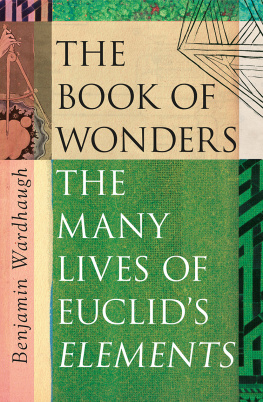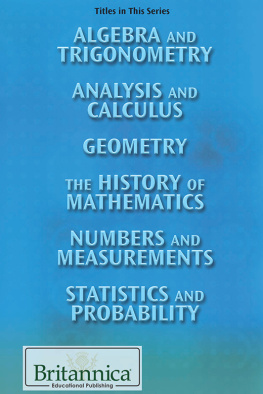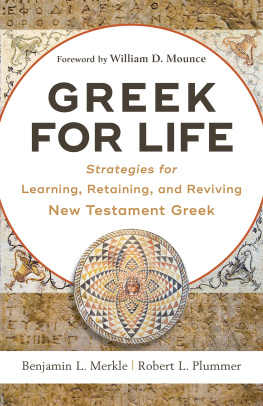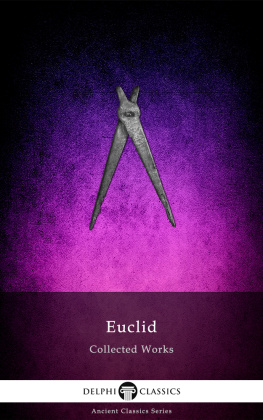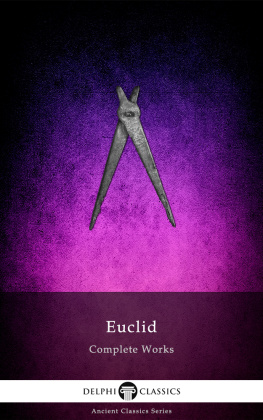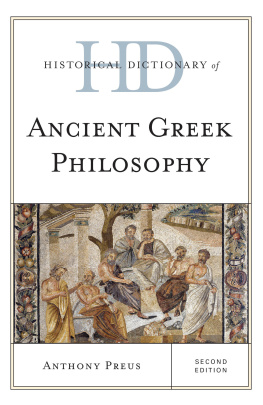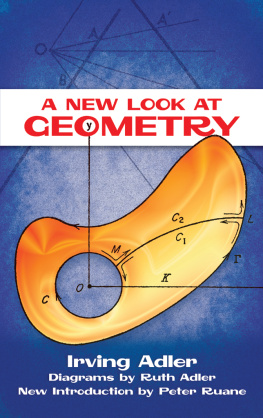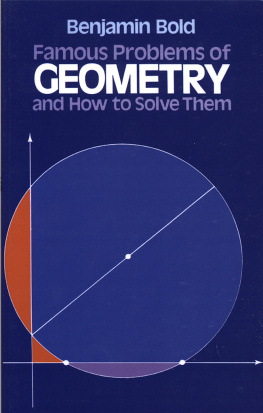Encounters
with Euclid
Also by Benjamin Wardhaugh
Poor Robins Prophecies: A Curious Almanac,
and the Everyday Mathematics of Georgian Britain
A Wealth of Numbers: An Anthology of
500 Years of Popular Mathematics Writing
Gunpowder & Geometry: The Life of Charles Hutton,
Pit Boy, Mathematician and Scientific Rebel
Encounters
with Euclid
How an Ancient Greek Geometry
Text Shaped the World
Benjamin Wardhaugh
Princeton University Press
Princeton and Oxford
Copyright 2021 by Benjamin Wardhaugh
Princeton University Press is committed to the protection of copyright and the
intellectual property our authors entrust to us. Copyright promotes the progress and
integrity of knowledge. Thank you for supporting free speech and the global exchange
of ideas by purchasing an authorized edition of this book. If you wish to reproduce
or distribute any part of it in any form, please obtain permission.
Requests for permission to reproduce material from this work
should be sent to permissions@press.princeton.edu
Published in the United States and Canada in 2021 by Princeton University Press
41 William Street, Princeton, New Jersey 08540
press.princeton.edu
Originally published in the English language in 2020 by HarperCollins Publishers Ltd.
under the title The Book of Wonders: The Many Lives of Euclids Elements
Benjamin Wardhaugh asserts the moral right to be identified as the author of this work
in accordance with the Copyright, Designs and Patents Act 1988
All Rights Reserved
Library of Congress Control Number 2021930241
ISBN 978-0-691-21169-5
ISBN (e-book) 978-0-691-21981-3
Version 1.0
Typeset in Sabon LT Std by Palimpsest Book Production Limited, Falkirk, Stirlingshire
For my parents
Contents
Prologue
Alexandria. Alexndreia. The reign of Ptolemy, first of the Alexandrians. Perhaps the tenth year of his reign: a little after 300 BC .
Arrive by sea, the Egyptian sun on the water. Cross the harbour; enter the city. Building upon building. Through the Gate of the Moon and up the boulevard, the Canopic Way. White marble; dust and hammering: building work everywhere. The grandest of cities. You can drive your carriage up the streets if you want to. Paved streets and white-faced buildings. The sea murmuring.
To the crossroads; turn left onto the Street of the Sema: long and cool, catching the wind. Into the palace quarter. Temples; museum; library.
One of the workers in the famous cultural quarter is a man named Euclid. One of his books, the Elements of Geometry. When Ptolemys glorious Alexandria is dust, it will live.

For twenty-three centuries the Elements of Geometry has been changing the world. A compendium of facts about space and its properties lines and shapes, numbers and ratios it has drawn countless readers into its limitless world of abstract beauties and pure ideas. And it has been on the most incredible journey. Few artefacts survive the collapse of the culture that produced them; few texts survive the abandonment of the language in which they are written. The Elements has survived both. Indeed, it seems to have positively thrived on its transplantation into a series of fantastically diverse situations. Its very austerity seems to have enabled readers to find in it qualities that made it interesting to them, characteristics that gave it meaning in their time and place.
The sculptors of the west facade of Chartres Cathedral depicted Euclid, and the scholars of Abbasid Baghdad translated his book. An American artist turned his diagrams into art, and an Athenian philosopher wrote a commentary on them. The Elements was implicated in the Scientific Revolution: the fateful decision to read the book of nature as if it was written in the language of mathematics.
In Beijing, between August 1606 and April the following year, the scholar Xu Guangqi and the Italian Jesuit Matteo Ricci worked to translate the Elements, one of the books Ricci had brought with him from the far west, into the language of the Mandarin scholar. They struggled with terminology, with the structure of the text, with the very different assumptions each brought to its subject matter. They revised the text three times before they were happy to release it for publication.
From May to November 1817, on the other side of the world, Anne Lister set aside her mornings for in equal proportions arithmetic and Euclid. By the autumn she had worked through more of the Elements than most university graduates.
A thousand years before, at Gandersheim in Lower Saxony, the canoness Hroswitha wrote into one of her plays Euclids definition of perfect numbers. It formed part of Wisdoms mockery of the emperor Hadrian, who was seeking to torture her and her daughters.

Again and again, new generations in new places have encountered the Elements and done new things with it. It has travelled through worlds that could never have been imagined by the Greeks who first wrote and read the text.
What does it mean for a book to live 2,000 years and more? To survive the wreck of the civilisation that produced it? To find readers again and again, in place after place and time after time? How vast a range of meanings do readers have to find in it? How vast a range of readers does it have to find?
Come on a journey and find out.
I
Author
Alexandria
The geometer and the king
Alexandria, around 300 BC .
A dinner, say: a symposium, in the palace quarter, perhaps in the Museum. Ptolemy himself in attendance: general, hero, king, deity. And the talk touches on geometry: why so hard? Why is there no easier way? The geometer a dusty man, but pert answers: Majesty, there is no royal road to geometry.

Ptolemy snubbed is one of the irresistible stories. The man had been a childhood friend of Alexander the Great; one of his bodyguard. Maybe his illegitimate half-brother. He was a trusted general (the name is said to mean warlike): level-headed but capable of the grand gesture; a man of no nonsense.
He was one of the great survivors, too. In the twenty years of chaos that followed Alexanders death, when many abler men died, Ptolemy played and won. Of all the successors who eventually carved up Alexanders brief, continent-spanning empire, he founded the longest dynasty, the stablest country. He chose Egypt, and he never risked it for a larger realm. Fourteen Ptolemaic rulers followed him, until Cleopatra lost it all at the Battle of Actium 250 years later. The first king, then, of the last Egyptian dynasty. Basileus to the Greeks, pharaoh to the Egyptians. Inheritor of 3,000 years of Egyptian kingship and, yes, a god too. In 306 BC he defeated an attack on Rhodes so soundly that altars were erected to him and he acquired the title saviour. By 278 BC there were Ptolemaic games in his honour: four-yearly, like the Olympics.
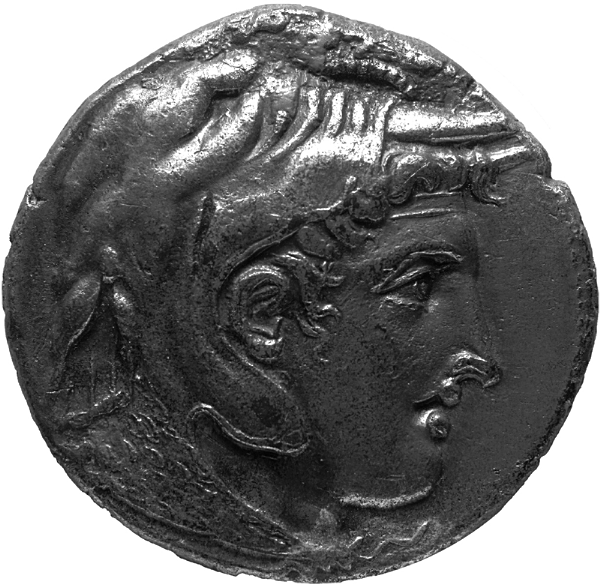
Ptolemy I Soter.
The geometer, by contrast a man named Euclid; Eukleds is utterly obscure, historically speaking. The story about the royal road is moonshine, sadly; it is also told about another geometer (Menaechmus) and another king (Alexander), and there is little reason to suppose it really happened. Even his dates sometime around 300 BC are the mere surmise of authors writing centuries after him. Unlike the exceptionally well-documented Ptolemy, Euclid left no biographical traces whatever. He founded no dynasty, built no palaces. His legacy was solely intellectual.
Next page

